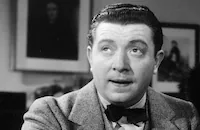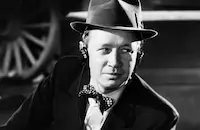Miss Grant Takes Richmond

Brief Synopsis
Cast & Crew
Lloyd Bacon
Lucille Ball
William Holden
Janis Carter
James Gleason
Gloria Henry
Film Details
Technical Specs

Synopsis
Ellen Grant is the worst student at the Woodruff secretarial school. Although Ellen's fiancé, assistant district attorney Ralph Winton, disapproves of her ambition to become a secretary, Ellen is determined to have a career. The day of Ellen's final exam, realtor Dick Richmond visits the school to pick a new secretary, and hires Ellen, despite her dismal score. When Ellen reports to work, she meets Dick's associates, Kilcoyne and J. Hobart Gleason. Unknown to Ellen, the office is a front for a bookie operation, and Dick hired her because he believes that she is too stupid to discover the truth. When Ellen meets her uncle, Judge Ben Grant, at the courthouse, she is distressed to learn that many tenants throughout the town are facing eviction and immediately decides to use her position to help people find inexpensive housing. To keep her from inadvertently revealing the real nature of their operation, Dick asks Gleason to dictate a letter agreeing to purchase some property. Believing their purchase to be legitimate, Ellen suggests that the company use the property for a low-cost housing project. While Ellen is trying to type the letter, Peggy Donato, Dick's former associate, offers him a position with her syndicate, but he turns her down. Although Dick throws the completed letter away, Ellen returns from lunch with Leo Hopkins, the sales agent for the property, and Ralph, and Dick is forced to sign a sales contract. Realizing that Ellen is going to cause him a lot of trouble, Dick decides to fire her, but cannot think of an excuse, and all his attempts to make her quit fail. Meanwhile, many of Ellen's friends are eager to buy homes in the new development, and Dick decides to take their money and leave town. Then Ellen forgets to give Dick a message from Peggy placing a $5,000 bet, and when Dick finally gets the message it is too late for him refuse the bet. Faced with paying Peggy an enormous amount of money, Dick decides to build a few houses on the property, sell them, embezzle enough money to pay Peggy and make Ellen take the blame. The next day, however, when the angry homeowners storm the office, Dick, Gleason and Kilcoyne are shamed, and in order to refund the money, Dick agrees to join Peggy's organization if she will forgive his debt. Dick then returns the money, and soon the houses are finished. By accident, Ellen learns the truth about Dick's business, and when Gleason and Kilcoyne tell her why Dick is joining Peggy, Ellen, the judge and other friends dress as gangsters and threaten Peggy. Although Ellen's ruse does not work, Kilcoyne and Gleason win a bet and use the money to ransom Dick. A happy Ellen and Dick embrace.

Director

Lloyd Bacon
Cast

Lucille Ball

William Holden

Janis Carter

James Gleason

Gloria Henry

Frank Mchugh
George Cleveland
Stephen Dunne
Arthur Space

Will Wright
Jimmy Lloyd
Loren Tindall
Ola Lorraine
Claire Meade

Roy Roberts

Charles Lane
Harry Harvey
Harry Cheshire
Nita Mathews
Glen Thompson
Syd Saylor
Michael Cisney

Eddie Acuff
Bill Lechner
Charles L. Marsh
Charles Hamilton

Peter Brocco
Toni Newman
Marjorie Stapp
Don Hayden
Bradley Johnson
Robert Strong
Bret Hamilton
Tom Kingston
Joe Recht
Walter Craig
Lewis Sargent
Jack Douglas
Eileen Stevens
Crew
Clay Campbell
James Crowe
Lambert Day
Devery Freeman
Everett Freeman
Carl Hiecke
Walter Holscher
Helen Hunt
Charles Lawton Jr.
Jean Louis
Earl Mcevoy
Nat Perrin
Heinz Roemheld
S. Sylvan Simon
Morris Stoloff
Frank Tashlin
Jerome Thoms

Film Details
Technical Specs

Articles
Miss Grant Takes Richmond
For Holden, Miss Grant Takes Richmond was another chance to break out of second-string roles. After a promising starring debut as the young boxer in Golden Boy (1939) and acclaimed work in films like Our Town (1940) and The Remarkable Andrew (1942), he'd seen little cinematic gold as he shuttled between Paramount Studios and Columbia Pictures. At the former, he was eclipsed at the box office by Alan Ladd; at the latter by his good friend Glenn Ford. Miss Grant Takes Richmond gave him a chance to break free of what he called his "smiling Jack" good guy roles to play a romantic hero with an edge. Some historians have even suggested that it paved the way for his casting in Born Yesterday (1950).
For Ball, Miss Grant Takes Richmond was part of a major career makeover. Frustrated after years of secondary films at RKO, she had moved to MGM only to be relegated to glamorous set dressing in their lavish musicals. All the while, however, she worked and watched, picking up comic tricks from the studio's resident slapstick star of the period, Red Skelton, and silent screen clown Buster Keaton, who was working there as a gag writer. When she left MGM to freelance, however, she had trouble finding suitable roles. Then she agreed to do a radio series for CBS. The network's president, Bill Paley, hoped to create a new generation of leading ladies who could move over to the infant television medium and thought Ball would be perfect. She passed on his initial offer to star in Our Miss Brooks, suggesting her friend Eve Arden would be better suited for the role of a sarcastic high school teacher. His next offer, the wacky wife in My Favorite Husband, seemed more suitable to her career plans, and she signed on. The show debuted as a one-shot fill-in, but did so well it was picked up as a summer series, then put on the regular schedule.
With the success of My Favorite Husband, Ball was a hot commodity in Hollywood. Columbia came up with what seemed the best offer -- a non-exclusive deal for three films at $85,000 a picture. Ball was attracted by the contract's openness and the studio's reputation for working quickly, which meant she would get her fee for a fairly short shooting schedule. She also thought she could get studio head Harry Cohn to hire her husband, bandleader Desi Arnaz, for a film. The studio's music department head urged Cohn to do just that, which gave Arnaz a chance to stop touring and actually live with his wife while shooting Cuban Pete (1946).
Ball also had a friend in Columbia producer S. Sylvan Simon. A former MGM director, Simon had hoped to steal Skelton from the studio to star in a series of slapstick comedies. When they couldn't break his MGM contract, however, he decided to build on Ball's radio image to turn her into a slapstick queen. His first effort in that direction was Miss Grant Takes Richmond.
Holden and Ball developed a warm working relationship. He appreciated her comic talents, and in some scenes critics have suggested he can be seen trying to control his laughter at her antics. The only problem they might have had -- he was seven years younger than she -- was solved by director Lloyd Bacon, who simply avoided any close-ups that might have shown up the disparity in their ages. Holden and Ball would reteam years later for a classic episode of I Love Lucy, in which he played himself as the victim of Lucy Ricardo's celebrity fascination.
Miss Grant Takes Richmond did well with the critics, while Ball's radio fans helped it turn a nice profit for Columbia. It wasn't a breakthrough hit for Holden -- he would have to wait for Sunset Boulevard (1950) to accomplish that -- but it showed he had the right touch for romantic comedy. Simon kept to his plan to use Ball as a slapstick comedienne, using her next in The Fuller Brush Girl (1950). Unfortunately, his surprise death a year later would put an end to their partnership. Cohn would burn off Ball's contract with a hastily made Arabian Nights potboiler, The Magic Carpet (1951). That flying turkey did little to hurt her career, however, as it came out as she was launching I Love Lucy, the television series that would make her a comedy legend.
Producer: S. Sylvan Simon
Director: Lloyd Bacon
Screenplay: Nat Perrin, Devery Freeman, Frank Tashlin
Based on a story by Everett Freeman
Cinematography: Charles Lawton, Jr.
Art Direction: Walter Holscher
Music: Heinz Roemheld
Principal Cast: Lucille Ball (Ellen Grant), William Holden (Dick Richmond), Janis Carter (Peggy Donato), James Gleason (J. Hobart Gleason), Gloria Henry (Helen White), Frank McHugh (Kilcoyne), George Cleveland (Judge Ben Grant), Roy Roberts (Foreman), Charles Lane (Woodruff).
BW-87m.
by Frank Miller

Miss Grant Takes Richmond
Quotes
Trivia
Notes
According to a December 11, 1941 Los Angeles Examiner news item, a script authored by Gene Towne and Mark Kelly entitled Miss Grant Takes Richmond was to be made by Columbia and star Rosalind Russell and Melvyn Douglas. Except for the title, however, the proposed story bears only a slight resemblance to the 1949 film. A July 22, 1948 Los Angeles Times news item reported that Russell might star in the 1949 film to fulfill her contractual agreement with Columbia. According to a February 10, 1949 Hollywood Reporter news item, Columbia tried to borrow Jack Carson from Warner Bros. for the film. On May 19, 1950, Lucille Ball starred in a Screen Directors' Playhouse version of the story.















